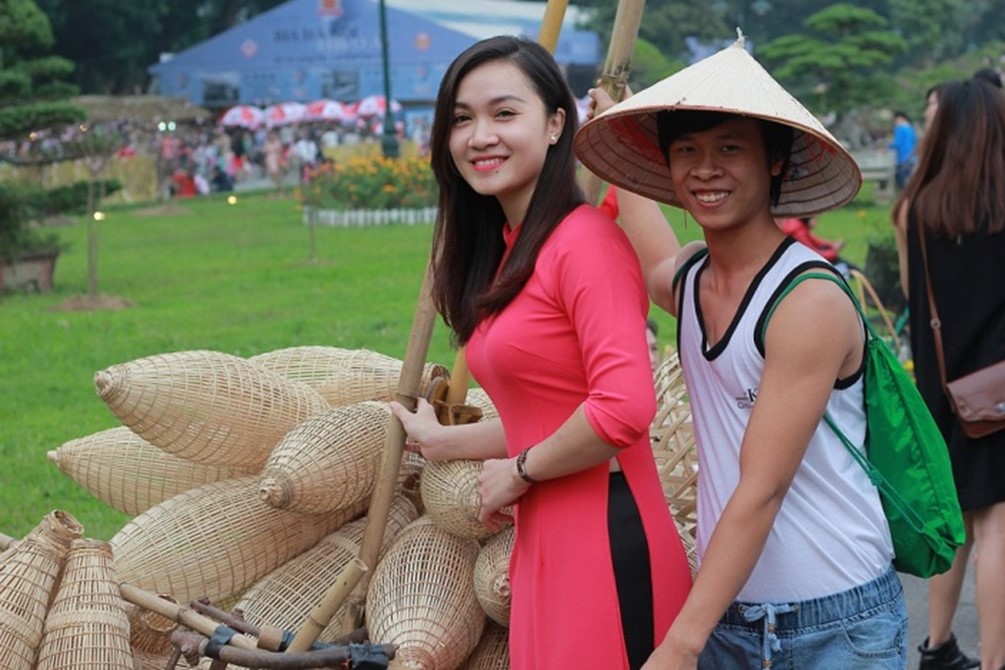Vietnamese is the official language of the whole country. It is a tonal language that is quite similar to Khmer which is Cambodia’s official language. With each syllable, there are 6 different tones that are being used which may also change the definition, something that foreigners have a hard time understanding.
Other languages are also spoken in Hanoi and in the entire country including Chinese, Cham, and Khmer as well as other local dialects spoken by tribes living in the mountain zone. In written form, the Vietnamese language uses the Roman alphabet and uses accent marks to show tones. The writing system is called Quoc Ngu. The Quoc Ngu was created and used around the 17th century to translate the Catholic scriptures. This writing system also replaced the Chu Nom and had been the unofficial writing system for many centuries.
Etiquette and Customs
The Vietnamese society has many public etiquette that any foreigner or tourists need to keep in mind. The following are the most common customs and etiquette in Hanoi and in Vietnam:
- As much as possible, try to avoid PDAs or public display of affection with the opposite sex especially in religious places.
- Do not touch someone’s head for no reason
- You must pass the items with both hands as a sign of respect
- Don’t use your finger when pointing, use your hand instead.
- Don’t stand with your hands on your hips and cross your arms as it can be considered rude.
- Don’t pass anything over someone’s head and don’t touch a person on the shoulder
- Shorts must only be worn at the beach or in private places.
Dining Etiquette
If you are invited over to a Vietnamese home, you should bring incense, flowers, or fruits. The gifts you bring should be wrapped up nicely. Don’t give yellow flowers, handkerchiefs or anything inappropriate. When it comes to table manners, you should wait for the host to show you where you should sit. For the Vietnamese, the oldest person sits first. When passing dishes, you should use both of your hands. Chopsticks are the most common utensil used; it should be placed on the table after every few mouthfuls or whenever one is speaking or drinking. It’s a norm among locals to hold bowls close to their faces when eating or sipping the soup.
Try to eat all the food on your plate and avoid ordering excessive food you can’t handle. Once you’re done, you should place your chopsticks on top of the rice bowl. Make sure to cover your mouth using a toothpick.
Business Etiquette
When it comes to setting appointments, it’s required to make it several weeks or days in advance. One of the best means of setting up an appointment is through a local representative that can also be a proxy and/ or interpreter. Take note that the Vietnamese are punctual so make sure to not be late. You should dress conservatively especially when attending a business meeting. Handshakes are usually used upon meeting for both men and women. Sometimes they use a two – handed shake wherein the left hand is on top of the right wrist. If you are a man, you must wait for a woman to extend her hand for a handshake; otherwise you can just bow your head. Business cards are usually exchanged during business meetings, and it should be offered with both hands. When someone presented you a card, make sure to properly receive it and don’t just leave it anywhere else.
When it comes to hierarchy, the most senior is the one who should enter the room first though it will vary within business meetings. It’s also important to note that silence is quite common in meeting especially when someone disagrees so as not to lose face. For Vietnamese people, building relationships are very important when it comes to business partnerships so always try to maintain a good relationship with your potential partners. The spoken word to them is also very important; you should not make promises you can’t keep. When it comes to negotiations, keep in mind that it can be slow because Vietnamese people take their time when taking decisions, and it needs to go through lots of consultation as well as government approvals (if any) so be patient.



 Good-humored, practical,and insightful, Downey’s travel books offer useful information in an easily accessible format.
Good-humored, practical,and insightful, Downey’s travel books offer useful information in an easily accessible format. 